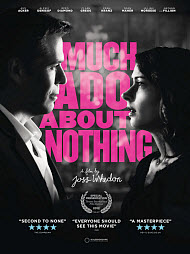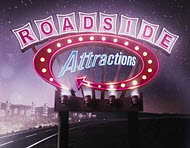Much Ado About Nothing
 for some sexuality and brief drug use.
for some sexuality and brief drug use.
Reviewed by: John Decker
CONTRIBUTOR
| Moral Rating: | Average—with caution |
| Moviemaking Quality: |
|
| Primary Audience: | Adults |
| Genre: | Romance Comedy Drama Adaptation |
| Length: | 1 hr. 47 min. |
| Year of Release: | 2013 |
| USA Release: |
June 7, 2013 (very limited, then widened) DVD: October 8, 2013 |












TRUE LOVE—What is true love and how do you know when you have found it? Answer
about the play and its history (Wikipedia)
| Featuring |
|---|
|
Amy Acker … Beatrice Alexis Denisof … Benedick Clark Gregg … Leonato Reed Diamond … Don Pedro Fran Kranz … Claudio Jillian Morgese … Hero Nathan Fillion … Dogberry Sean Maher … Don John Spencer Treat Clark … Borachio Riki Lindhome … Conrade See all » |
| Director |
| Joss Whedon — “Firefly,” “Marvel’s The Avengers,” “Toy Story,” “Buffy the Vampire Slayer” |
| Producer |
|
Bellwether Pictures Joss Whedon … producer Kai Cole … producer See all » |
| Distributor |
The circumstances surrounding the creation of this play-made-movie certainly contribute to its style. It was made in 12 days at the home of the director. The acting is bright and spontaneous, which charms plenty of Shakespeare laughter into the work.
I do not know the play well enough to say that the movie is a word-for-word usage of it, but as I sit and read several sections of the play, I recall the words verbatim from the movie. In-fact, I can’t find a word out of place. If it strikes you as odd to think this would be enjoyable outside of a good opportunity for a nap, I don’t necessarily blame you. I will none-the-less tell you that I sincerely liked this movie, and very much.
The modern housing and dress is balanced by the film being in black and white. The witty, out of time, drawn out Shakespeare verbiage is balanced by quite natural acting. Several times I laughed simply at the delight that Shakespearean expression was being pulled off so well. Most of the emotions are well interpreted and modern. This is far from simply being a good reading of the play. It’s felt deeply and is much easier to follow than your average Shakespeare play, I might add. I am not sure if that’s for the sheer acting talent involved or some other elements, like good timing on the part of the editor and director or a good general use of silence by all parties, which I believe is essential to drama and is often lacking on stage, due in part to the discomfort that silence in front of an audience brings.
Joss Whedon’s “Much Ado About Nothing” is an adult film. There is no nudity. I would summarize the sexuality as somewhat visual and more heavily suggestive. There are some low cut dresses and high shots of female legs. In several scenes sexuality is depicted, rather than shown. A highly out-of-focus shot shows a skirt being pulled up toward the thigh. Most of the sexual depictions are out-of-focus. One out-of-focus scene, in particular, has two figures on a bed in continual motion for a few seconds, and the implication is obvious—to the adult mind, at least.
The most explicit scene is not out of focus: a man is on a bed on his knees, facing a woman in a dress as she wraps her legs around his back. Again, there is no nudity here, but the poses are extremely suggestive, and, at one point, the man’s hand ends up under the sheet suggestively. Due to the lack of actual nudity and due to the sexual portrayals being the short and often passing imaginations of one character or another, most are hazy (again, out-of-focus) and dream-like, I am tempted to play down the sexuality in my review, however, there is a lot of it there. Is it part of the story? Yes. Is it par for the course? Doesn’t have to be. Could it have been worse? I’m actually impressed with the modest amount of sexuality in contrast to what we are used to. Could the film have been all that it was without it? Absolutely.
Regarding the sexuality, I will add one caveat—I am confident that a good number of movie-goers will disagree with my assessment of the sexuality in this film. My aim is to be complete, however, not lenient. My suggestion would be seeing this movie yourself before letting anyone under 17 see it, though it has been rated PG-13. Surely the MPA is far from a Christian organization, and their objective is to categorize, not preserve innocence and purity. The difference between categorizing content and preserving values is as stark a contrast as the difference between law and grace.
There is zero violence in this film or play. The MPA says there is drug use. It was unclear to me if they were smoking cigarettes or something else. There is quite a bit of alcohol drinking. There is no cursing, in the modern sense, save the use of “ass” quite a bit, in the insult sense. It is repeated six to twelve times in the play, and that rings about right for the film.
The inspectors, the police, are portrayed as absolute buffoons. There is a lame and fumbling dumb police buffoon and a self-praising leader police buffoon and other police buffoons, but each one of the inspectors lacks more grace than any other character in the entire film. I am surprised to know that this is true to the play, as it was written, but it surely is. It seems some of our folly is timeless in disrespect toward ministers of righteousness.
This is a high quality film. I am giving it a five due to it being the best of the Shakespeare-to-film genre I’ve ever seen.
Violence: None / Profanity: Mild / Sex/Nudity: Moderate
See list of Relevant Issues—questions-and-answers.


PLEASE share your observations and insights to be posted here.

